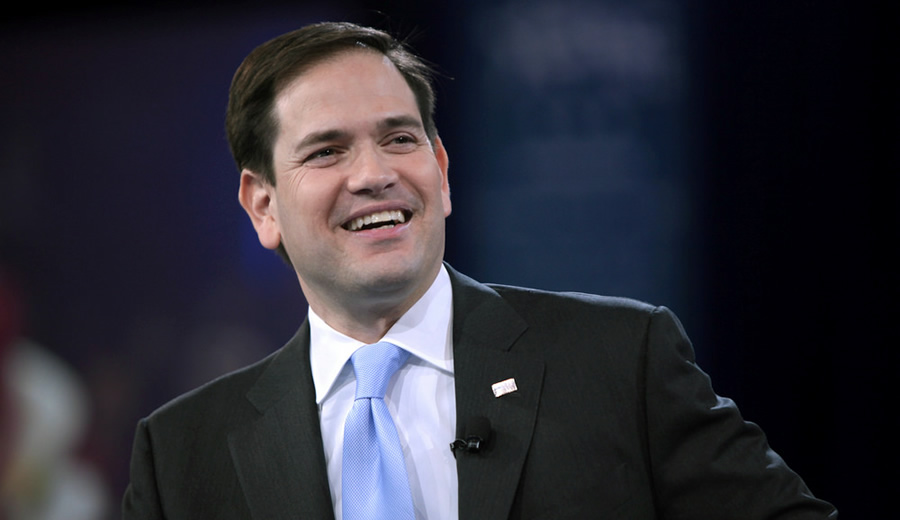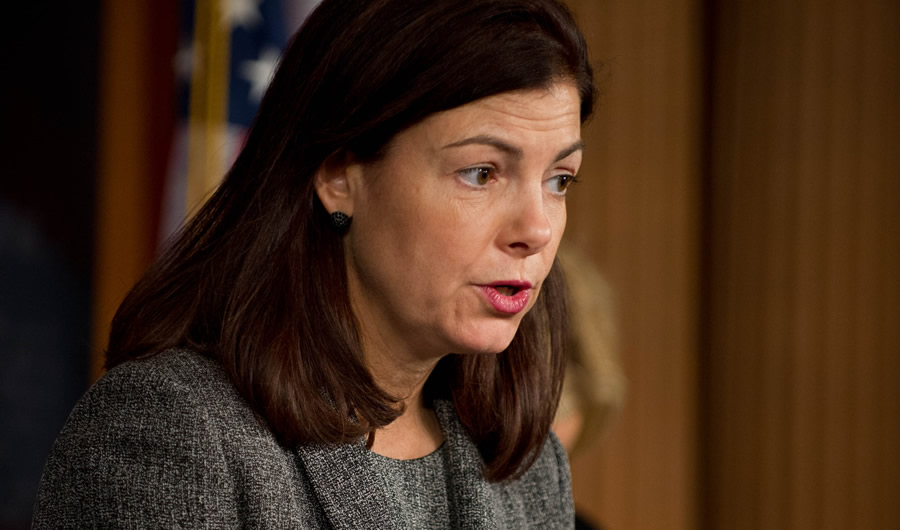5 Key Senate Races That Could Tip the Balance of Power in November
November will feature fierce incumbency races that will decide if the Republicans keep the U.S. Senate or the Democrats reclaim it.
Thirty-four Senate seats are up for reelection in 2016, and Democrats only need to flip five (or four if they retain the presidency) to grab the majority. One previously blue seat could turn “red” in November, but the Republicans will be playing defense in the other tight races. TheDCNF will highlight five must-win, tightly contested races in states Obama carried in 2012.
1. Harry Reid’s (D) Vacancy in Nevada

In this August 10, 2009 file photo, then-Senate Majority Leader Harry Reid (D-NV) listens while attending the National Clean Energy Summit. (Source: Flickr/americanprogressaction)
The Senate Minority Leader Harry Reid announced in March of last year he would not be running for reelection. Reid told the New York Times, “I want to be able to go out at the top of my game.”
Reid’s handpicked successor is former Nevada Attorney General, Catherine Cortez Masto. According to political science professor at UNLV David Damore, “If Democrats want to get back the Senate, they have to win this seat.” Masto will look to emphasize that she would be the first Latina in the Senate, which means her GOP challenger Joe Heck’s odds may hinge on Trump’s ability to improve favorability among Latino voters.
Heck is currently representing Nevada’s 3rd District in the U.S. House of Representatives and had GOP establishment support when he beat out Tea Party favorite Sharron Angle in the Nevada primary. Turning Reid’s seat could offer Republicans some much needed relief defending its 24 seats this cycle.
The RealClearPolitics (RCP) polling average has Heck with a three point advantage over Masto, 43.7 to 40.7.
2. Marco Rubio (R) vs. TBD

U.S. Senator Marco Rubio of Florida speaks at the 2016 Conservative Political Action Conference (CPAC) in National Harbor, Maryland. (Source: Flickr/Gage Skidmore)
After a grueling presidential primary, Marco Rubio announced his retirement from the Senate in March. Then, he changed his mind, admitting that, “Control of the Senate may very well come down to the race in Florida.” Rubio reentered the ring and promised to stand up to Donald Trump, if necessary.
The Democratic challenger has not been officially announced, but U.S. Congressmen Patrick Murphy (FL-18) and Alan Grayson (FL-9) are on the shortlist. Both Democratic candidates are steeped in controversy, with Murphy facing criticism for lying about his business and Grayson getting punished in the polls for a report about a history of domestic abuse.
Still, the Florida race looks to be a tight one. The latest RCP polls have Rubio up three points on Murphy, 47 to 44.
3. Kelly Ayotte (R) vs. Maggie Hassan (D)

In this November 14, 2013 file photo, Sen. Kelly Ayotte (R-N.H.), pictured, along with Sen. Claire McCaskill (D-Mo.) and Sen. Deb Fischer (R-Neb.) announce a set of bipartisan provisions aimed at curbing military sexual assault. (Source: Flickr/Senator Claire McCaskill)
In January of 2016, Democrat Maggie Hassan announced she would resign as Governor of New Hampshire to challenge Republican Senator Kelly Ayotte. Politico referred to the situation as “the rare spectacle of a popular sitting governor taking on a well-liked incumbent senator.”
In 2008, former Democratic Governor Jeanne Shaheen unseated Republican Senator John Sununu. If Hassan’s bid is successful then New Hampshire will have two Democratic Senators for the first time in close to 40 years.
Hassan has cast Ayotte as beholden to NRA interests and voting in accordance to the Koch’s wishes. Roll Call listed Hassan in first place on its Senate challenger rankings.
4. Rob Portman (R) vs. Ted Strickland (D)

U.S. Senator Rob Portman speaks at the 2015 Defending the American Dream Summit at the Greater Columbus Convention Center in Columbus, Ohio on August 22, 2015. (Source: Flickr/Gage Skidmore)
Former governor of Ohio Ted Strickland announced his bid for the Senate on February 25, 2015. Strickland lost the governor’s race in 2010 to current Governor John Kasich. He made his announcement to run for Senate a week after resigning as President of the Center for American Progress Action Fund, a left-wing public policy group.
Ohio’s Fraternal Order of Police and the Ohio Teamsters are endorsing Portman though they supported Strickland in 2006 and 2010, Politico reports. Portman is citing these endorsements as proof of Strickland’s failure as governor. The United Auto Workers, the AFL-CIO, and the Service Employees International Union are also officially endorsing Portman, along with a local Black Lives Matter group.
Portman is leading by an average of four points.
5. Ron Johnson (R) vs. Russ Feingold (D)

U.S. Senator Ron Johnson of Wisconsin speaks at the 2016 Conservative Political Action Conference (CPAC) in National Harbor, Maryland on March 3, 2016. (Source: Flickr/Gage Skidmore)
Russ Feingold painted a list of promises on his garage door during his run for Senate in 1992. Among those promises to the “every man” of Wisconsin was a vow to “rely on Wisconsin citizens for most of my contributions.” His approach worked three times in a row until 2010, when he was ousted by current Sen. Ron Johnson.
Shortly after Feingold announced his intentions for a rematch in May of 2015, Politifact revealed Feingold’s campaign coffers of over $2.3 million. The majority of this sum was from outside the state. Politifact rated this reversal “a full flop.” Feingold is serious about not repeating his mistakes from 2010, and the RCP average shows a Feingold advantage of 9.3, with Republican Johnson at 40.7 and Feingold at 50.
BONUS: Tim Kaine’s (D) Potential Vacancy
Should Clinton win in November, Democratic Governor Terry McAuliffe will appoint somebody to fill Tim Kaine’s Senate seat for a year. State law then requires a special election for a full six-year term to be held in 2017 during the gubernatorial election.
McAuliffe will likely appoint Rep. Bobby Scott of Virginia’s 3rd district, Rep. Gerald Connolly of Virginia’s 11th district, or Attorney General Mark Herring, according to the Washington Post. Possible Republican challengers include former attorney general Ken Cuccinelli, Rep. Rob Wittman, or Rep. Barbara Comstock.
Cuccinelli made noise joining Ted Cruz as a leader of the “Never Trump” movement at the RNC in Cleveland and would have Tea Party backing. McAuliffe could also decide to run since Virginia law disallows consecutive terms as governor. In this scenario, the 2017 Senate election in Virginia would be a rematch of 2013, in which Cuccinelli narrowly lost the Governor’s mansion in Virginia to McAuliffe.
Current election outlook favors a Democrat takeover of the Senate, 59 to 41 percent.
Follow Jonathan On Twitter. Send tips to haggerty.dcnf@gmail.com
Copyright 2016 Daily Caller News Foundation

